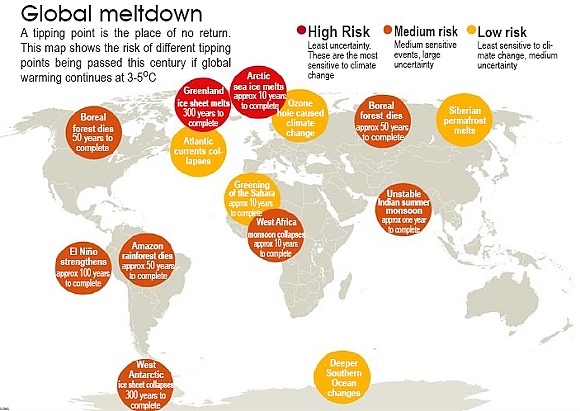By USA News Group (Originally in English)
Global warming has become a familiar phrase around the world. Yet its imminence, gravity and consequences are not widely understood. The Earth’s environment is a delicately woven mantle. But since the early 1800s, human-related activities such as unchecked fossil fuel use, deforestation and industrialization have been generating excessive amounts of greenhouse gases that become trapped in the atmosphere and thus disrupt nature’s fine balance. A recent study by a team of leading climate scientists in Britain identified areas of concern that mark the “Tipping Point” of climate change, or the critical threshold of raised temperatures that will cause irreversible chain effects on the Earth’s weather, environment and inhabitants. Professor Tim Lenton from the University of East Anglia, the leading researcher on the study, stated that: “The greatest threats are tipping of the Arctic sea-ice and the Greenland ice sheet, and at least five other elements could surprise us by exhibiting a nearby tipping point.” The “tipping point” that Dr. Lenton refers to is, for example, a temperature increase of 0.5°C to 2°C would cause increased melting of the Greenland ice sheet and the Arctic sea ice, which not only would raise sea levels, but the ice loss would cause these areas to stop reflecting the sun’s warming rays, resulting in continual increases in atmospheric temperature. It will then produce further, more widespread melting, causing a chain of natural disasters such as floods, droughts, major toxic gas emissions from the oceans and huge losses of plant and animal species. In a domino effect, our planet could see the collapse of the Indian monsoon, as well as the dieback of the Amazon rainforest and the Boreal forest in the far northern regions. When the Earth’s temperature increases more than 5°C, more ice melting, uncontrollable significant sea level rises and unpredictable weather patterns will reach catastrophic levels, which will not only endanger other species but also humankind’s survival. The endangered areas and the rate of melting are shown in the following map according to Prof. Lenton’s report:
http://image.guardian.co.uk/sys-files/Guardian/documents/2008/02/05/World_Tipping_map_0502.pdf But the reality is that the time frame to reach the tipping point is much sooner than Prof. Lenton’s calculation, due to the chain effect of warming and the shear-lag effect of carbon emission on the climate. In fact, a report from German Advisory Council on Global Change indicated that the Earth is heading towards security risk at an accelerating rate. (http://www.wbgu.de/wbgu_jg2007_engl.html Similarly, the most recent research findings of Norwegian climate expert Dr. Olav Orheim show that Arctic’s polar ice cap has been shrinking much faster than estimated, with a record low surface area in 2007. Even if the Earth’s temperature remains the same this year, the Arctic ice cap will still melt away. Another article in the recent issue of Scientific American also pointed out the bias of the models used in the studies in predicting ice melting effect, which means the consequences of climate change are much severe and occurring much quicker than those calculations. Supreme Master Ching Hai has already foreseen the situation, She pointed out: “The climate is warming quicker than they predict; that’s the problem. Because when one thing warms, it makes another thing warm. So, if the ocean is warm, it melts the ice. When the ice is there, it reflects the heat, and so the ocean is less warm. But now the ocean is warm enough to melt the ice, and so there is nothing to reflect the heat; therefore, the ocean is warmer.” Thus it is beyond questioning that global warming is a serious problem now near the “tipping point” of no return. Since the climate change is solely human activity-related, immediate actions are necessary from all aspect of human society, such as economic strategies, legislations and even things as everyday as our diet. Yes, our diet is worthy of re-evaluating!
Considering the inefficient consumption of fossil fuels during food
production as well as the more potent green house gas such as methane
and ammonia emitted from livestock’s waste, it won’t be
too hard to accept the fact that, for example, the Americans’
meat-based diet produces an extra 1.5 tons of carbon dioxide compared
to a strict vegetarian diet or vegan diet. It can not be emphasized
enough that being vegetarian or vegan,
along with adopting renewable energies and living a more sustainable
lifestyle, are among the most powerful and immediate means to stop
the earth from getting warmer and save this beautiful planet.
http://www.guardian.co.uk/environment/2008/feb/05/climatechange
| |||||||||||

